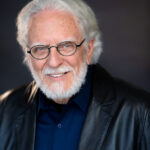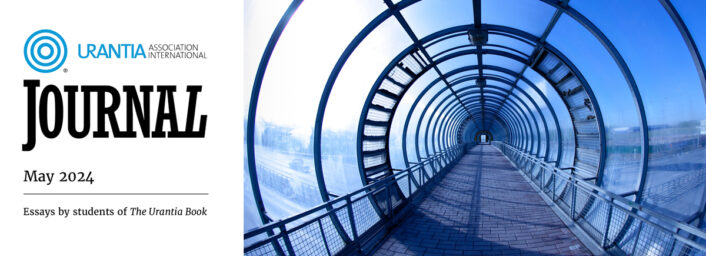© 2024 Richard Jernigan, David Kantor, James Woodward, Mark Blackham, Richard E. Warren
© 2024 International Urantia Association (IUA)

¶ In This Issue
- Journal Editorial – May 2024 – Richard Jernigan, USA
- Thomas Aquinas and Some Speculation on the Origin of The Urantia Book – David Kantor, USA
- What is Morontia? – James Woodward, USA
- Dealing With Conflict in A Spiritual Life – Mark Blackham, Canada
- Truth, Beauty, Goodness, and the Father’s Will – Richard E. Warren, USA
- About the Journal
¶ Journal Editorial – May 2024
Richard Jernigan, USA

In every study group I’ve attended over the years conjecture invariably enters our discussions. Some of it is wild speculation; other comments are more thoughtfully informed. In this issue of Journal we feature two interesting propositions. David Kantor, who has been working on a documentary focused on Christianity and The Urantia Book, speculates on the role of Christian philosopher Thomas Aquinas’ 13th century Summa Theologica as possible groundwork for the fifth epochal revelation. James Woodward gives us a detailed analysis of that allusive word “morontia,” and why it was necessary for the revelators to invent a new term to embrace a new concept more adequately.
Also, in this issue Mark Blackham explores the idea that the celestial personalities far above us sometimes find themselves at odds with one another. In his article “Dealing With Conflict In A Spiritual Life,” Mr. Blackham observes that disagreement in the heavenly realms is not unusual, particularly at the system, constellation, and local universe levels. He delineates the multiple beings whose role it is to mediate and reconcile the problems arising in creating and managing our grand universe.
Bringing us back to how our celestial friends do guide and enlighten us with new truths, Richard E. Warren provides a three-part study on “Truth, Beauty, and Goodness and the Father,” and how those three supreme values inform and help us develop our relationship with God.
¶ Thomas Aquinas and Some Speculation on the Origin of The Urantia Book
David Kantor, USA

Curiosity, rumors, second-hand recollections, and imaginative speculation continue to fuel interest in a topic of widespread interest—How The Urantia Book came into existence. While the true story likely never will be known by humans simply because it involves things beyond our comprehension, it’s possible to amuse ourselves by creating a plausible story from these suppositions as they combine with information taken from The Urantia Book and the history of Christianity. So, consider the following as mere speculation.
Emma Christensen, the last of the Contact Commissioners, told me that work on the revelation began in the Middle Ages. Other apocryphal sources specify the 1200s. From comments in The Urantia Book, we can reasonably assume that Machiventa was present on the planet in the capacity of Resident Governor General sometime in the High Middle Ages. This period, particularly in the 12th century, saw a widespread spiritual awakening across Europe. It was the apex of Christian civilization. There was a desire to know more about Jesus and how to live a Christ-like life (see references below).
¶ What is Morontia?
James Woodward, USA

Definitions
Though it may be premature to forecast wide acceptance of The Urantia Book, it’s clearly rising in visibility due to decades of wise dissemination efforts and, of course, the internet. The first page of the Foreword, however, carries four statements calling attention to the serious problem of confusion on Urantia. We are notified—and warned—that progress on our world will depend on the evolution of human wisdom and revelation. Our own community of reader / believers is also confused about certain terms and definitions found in the teachings. We ought to resolve this confusion among Urantia Book devotees as we continue to take the advanced messages out into the mainstream. It is in that spirit that I advance my personal theory: morontia is akin to supermorality.
Evolving mortal creatures experience an irresistible urge to symbolize their finite concepts of God. Man’s consciousness of moral duty and his spiritual idealism represent a value level—an experiential reality—which is difficult of symbolization. UB 0:2.1 [all bold indicates author’s emphasis]
¶ Dealing With Conflict in A Spiritual Life
Mark Blackham, Canada

Conflicts are an inevitable part of life on inhabited worlds, especially those worlds in the earlier stages of social and spiritual evolution. And this is certainly the case at the present stage of development on Urantia.
Things have improved over the centuries and, no doubt, they will continue to improve over time. But not until the distant future, when our planet finally attains the utopian ages of light and life, will we be entirely free of discord. This is not to say that, at such a time, we will all be of the same mind. But the way we deal with our differences will change significantly. Until we reach that utopia, and apart from national wars, we will experience two personal spheres of conflict—one is the conflict that takes place in the inner life (mind and soul), and the other is the conflict that occurs in the outer life (family and social).
¶ Truth, Beauty, Goodness, and the Father’s Will
Richard E. Warren, USA

Part 1 of 3
To material, evolutionary, finite creatures, a life predicated on the living of the Father’s will leads directly to the attainment of spirit supremacy in the personality arena and brings such creatures one step nearer the comprehension of the Father-Infinite. Such a Father life is one predicated on truth, sensitive to beauty, and dominated by goodness. UB 106:9.12
When the adventure of organizing time and space began, God commanded an imperfect universe to: “Be you perfect, even as I am perfect.” In time, along with the rest of creation, we will attain perfection and satisfy this preeminent and organizing command from the Father of all by living truth, creating beauty, and performing goodness.
¶ About the Journal

The Journal is produced twice yearly and contains essays, articles and study aids by readers and for readers of The Urantia Book. Any interpretations, opinions, conclusions, or artistic representations, whether stated or implied, are those of the authors and do not necessarily represent the views and opinions of Urantia Association International, the National or Local Urantia Associations, or the editorial team of the Association’s Journal.
You can view the entire collection of issues in the archives. All issues before 2017 are downloadable PDF format.
The Journal is currently published in English, French and Spanish. (There are some older issues that were published in Finnish) You can view the French and Spanish Journals by clicking on the language choices in the pull down menu at the top of the page.